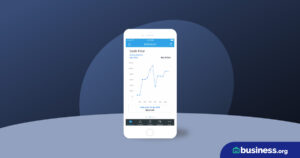💸 See if your business qualifies for a tax credit worth up to $26k per employee. 📞 Call Now: 855-979-9597
The Difference between Bookkeeping and Accounting
We are committed to sharing unbiased reviews. Some of the links on our site are from our partners who compensate us. Read our editorial guidelines and advertising disclosure.
Most laypeople (meaning anyone who isn’t an accountant or bookkeeper) use the terms bookkeeping and accounting interchangeably, and it isn’t until they open a business or start drafting a financial plan that they realize the two are far from the same.
If you want a quick definition, here it is: bookkeeping means recording a business’s finances, and accounting means analyzing financial records. Want a longer explanation? Keep reading—this article is for you.
What is bookkeeping?
Bookkeeping refers to the act of keeping financial records (“keeping the books,” if you will . . . and you should). At a minimum, bookkeeping means performing the following tasks:
- Creating and maintaining a list of your business’s debits and credits
- Recording your business’s financial transactions
- Generating important financial statements like income statements, cash flow statements, and balance sheets
As a business owner, you can accomplish these tasks with bookkeeping software, or you can hire a bookkeeper to do them for you.
What is accounting?
At its most basic level, accounting refers to analyzing financial data so you can make informed financial decisions about your business. Accounting includes activities like these:
- Reviewing and analyzing financial statements to understand what the data means for your business’s profitability and future
- Making recommendations about business operations based on financial data
- Preparing and filing taxes
In sum, bookkeeping presents you with clear, accurate financial information. Accounting helps you understand that information so you can make wise financial decisions.
By signing up I agree to the Terms of Use and Privacy Policy.
What are your bookkeeping and accounting options?
Based on these definitions, you can see why bookkeeping and accounting are essential to your business’s success—but how do you actually accomplish these tasks?
As a small-business owner, you can always take care of them yourself with accounting software, which both generates financial reports for you and helps you understand that data in the context of your business.
If you’re not comfortable doing your own bookkeeping and accounting—or if you simply don’t have the time—don’t worry. A professional can tackle it for you, though at a much steeper cost than most software.
Should you hire a bookkeeper or an accountant?
As you can imagine, there are quite a few differences between bookkeepers and accountants, including the level of education each job requires.
Bookkeepers are responsible for maintaining your business’s financial records. They need solid math and organizational skills, plus a working knowledge of accounting software. As per the Bureau of Labor Statistics, bookkeepers usually have a postsecondary degree, though not necessarily in bookkeeping.1 And most bookkeepers make around $40,000 a year.1
Accountants are responsible for assessing your business’s finances and making financial recommendations that keep your business in the black. They can also prepare financial statements and record financial information, so accountants should have solid bookkeeping skills. Most accountants have, at minimum, a bachelor’s degree, though it might not be in accounting. Most accountants make around $70,000 a year.2
And a Certified Public Accountant, or CPA, is an accountant who has taken a test called the Uniform CPA Examination and met your state’s requirements for state certification. While CPA licensing requirements vary from state to state, they usually include a bachelor’s degree in accounting and at least a year’s worth of on-the-job experience. To maintain their license, CPAs have to continue taking courses throughout their careers.
The takeaway
Sure, most small-business owners don’t start businesses because they’re accounting experts. But keeping accurate books and understanding what the numbers mean can spell the difference between business success and failure.
Want to learn more about keeping your own books? Check out our post on bookkeeping basics for small businesses.
Sources
1. Bureau of Labor Statistics, “Bookkeeping, Accounting, and Auditing Clerks”
2. Bureau of Labor Statistics, “Accountants and Auditors”






